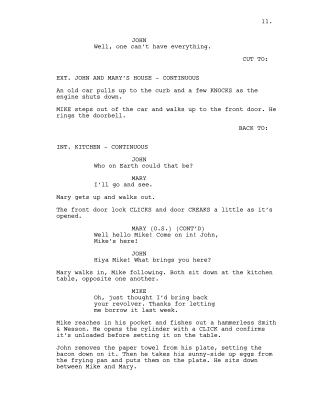
A screenplay writer is a writer who practices the craft of screenwriting, writing screenplays on which mass media, such as films, television programs and video games, are based.

The Screen Actors Guild (SAG) was an American labor union which represented over 100,000 film and television principal and background performers worldwide. On March 30, 2012, the union leadership announced that the SAG membership voted to merge with the American Federation of Television and Radio Artists (AFTRA) to create SAG-AFTRA.

The Writers Guild of America (WGA) is the joint efforts of two different American labor unions representing writers in film, television, radio, and online media:
Residuals are financial compensations that are paid to the actors, film or television directors, and others involved in making TV shows and movies in cases of the cable reruns, syndication, DVD release, or licensing to streaming media. Residuals are calculated and administered by industry trade unions like SAG-AFTRA, the Directors Guild of America, and the Writers Guild of America. The word is typically used in the plural form.
The Animation Guild, IATSE Local 839, also known as The Animation Guild, or TAG is a professional guild and union of animation artists, writers and technicians. The full name of the organization is The Animation Guild and Affiliated Optical Electronic and Graphic Arts, Local 839 of the International Alliance of Theatrical Stage Employees and Moving Picture Technicians, Artists and Allied Crafts of the United States, its Territories and Canada, American Federation of Labor-Congress of Industrial Organizations/Canadian Labour Congress.

The Writers Guild of Canada (WGC) is a trade union representing professional writers working in film, television, radio, and digital media production in Canada. Members of the WGC write dramatic TV series, feature films, Movies of the Week, documentaries, animation, comedy and variety series, children's and educational programming, radio drama, as well as corporate videos and digital media productions. The organization administers the annual WGC Screenwriting Awards.

Melissa Anne Rosenberg is an American television writer, television producer, and screenwriter. She has worked in both film and television and has won a Peabody Award. She has also been nominated for two Emmy Awards, and two Writers Guild of America Awards. Since joining the Writers Guild of America, she has been involved in its board of directors and was a strike captain during the 2007–2008 Writers Guild of America strike. She supports female screenwriters through the WGA Diversity Committee and co-founded the League of Hollywood Women Writers.

The Writers Guild of America, East (WGAE) is a labor union representing writers in film, television, radio, news, and online media.

The Writers Guild of America West (WGAW) is a labor union representing film, television, radio, and new media writers. It was formed in 1954 from five organizations representing writers, including the Screen Writers Guild. It has around 20,000 members.
In film industry terminology, movie packaging or film packaging is a type of product bundling in which a top-level talent agency starts up a film or television project using writers, directors and/or actors it represents, before giving other agencies a chance to submit their clients for the project. For this service, the talent agency negotiates a packaging fee. Packaging is frequently done by the “big four” talent agencies Creative Artists Agency (CAA), Endeavor, United Talent Agency, and ICM Partners.

The 2007–08 Writers Guild of America strike was a strike action that occurred from November 5, 2007, to February 12, 2008. All 12,000 film and television screenwriters of the American labor unions Writers Guild of America, East (WGAE), and Writers Guild of America West (WGAW) went on strike.

The Alliance of Motion Picture and Television Producers (AMPTP) is a trade association based in Sherman Oaks, Los Angeles, California, that represents over 350 American television and film production companies in collective bargaining negotiations with entertainment industry trade unions that include, among others, SAG-AFTRA, the Directors Guild of America, the Writers Guild of America West and East, the American Federation of Musicians, and the International Alliance of Theatrical Stage Employees.

The Screen Actors Guild-American Federation of Television and Radio Artists is an American labor union representing approximately 160,000 media professionals worldwide. SAG-AFTRA is a member of the AFL-CIO, the largest federation of unions in the United States. SAG-AFTRA is also a member of the International Federation of Actors (FIA).
2023 in film is an overview of events, including award ceremonies, festivals, a list of country- and genre-specific lists of films released, and notable deaths. This year, Walt Disney Studios and Warner Bros. celebrate their 100th anniversaries.

The 1980 actors strike was a labor strike held in July–October 1980 by the Screen Actors Guild (SAG) and the American Federation of Television and Radio Artists (AFTRA), two labor unions representing actors in the American film industry. The strike was caused by a breakdown in labor contract negotiations between the two unions and representatives of film studios, television networks, and other independent producers. The primary point of contention regarded residuals from home media, such as videocassettes and pay television. Specifically, the union was seeking a form of profit sharing wherein they would receive a percentage of the revenue made from home media releases. Additionally, the unions wanted a 35 percent salary increase across the board for their members. By mid-July, the union and industry representatives were at an impasse, and the strike started on July 21. Several days later, the American Federation of Musicians also went on strike for similar reasons.
Wonder Man is an upcoming American television miniseries created by Destin Daniel Cretton and Andrew Guest for the streaming service Disney+, based on the Marvel Comics character of the same name. It is intended to be part of the television series in the Marvel Cinematic Universe (MCU) produced by Marvel Studios, sharing continuity with the films of the franchise. Guest serves as head writer. The series is also produced by Family Owned.

From May 2 to September 27, 2023, the Writers Guild of America (WGA)—representing 11,500 screenwriters—went on strike over a labor dispute with the Alliance of Motion Picture and Television Producers (AMPTP). The 148-day strike was the longest interruption to American film and television production since the COVID-19 pandemic, as well as the second longest labor stoppage that the WGA has performed since the strike of 1988, which lasted for 153 days. Along with the 2023 SAG-AFTRA strike, which continued after the writers' strike ended, it was part of a series of broader Hollywood labor disputes.

The 2023 SAG-AFTRA strike is an ongoing strike action that began on July 14, 2023. The American actors' union SAG-AFTRA went on strike over an ongoing labor dispute with the Alliance of Motion Picture and Television Producers (AMPTP).

Since May 2, 2023, a series of ongoing labor disputes within the film and television industries of the United States has been taking place, mainly focused on the strikes of the Writers Guild of America and SAG-AFTRA. It is the second time two Hollywood labor unions are striking simultaneously — the first having occurred in 1960 – and as such, the American news media has named this phenomenon the "Hollywood double strike," and is expected to surpass the 1960 dual strike as well.













